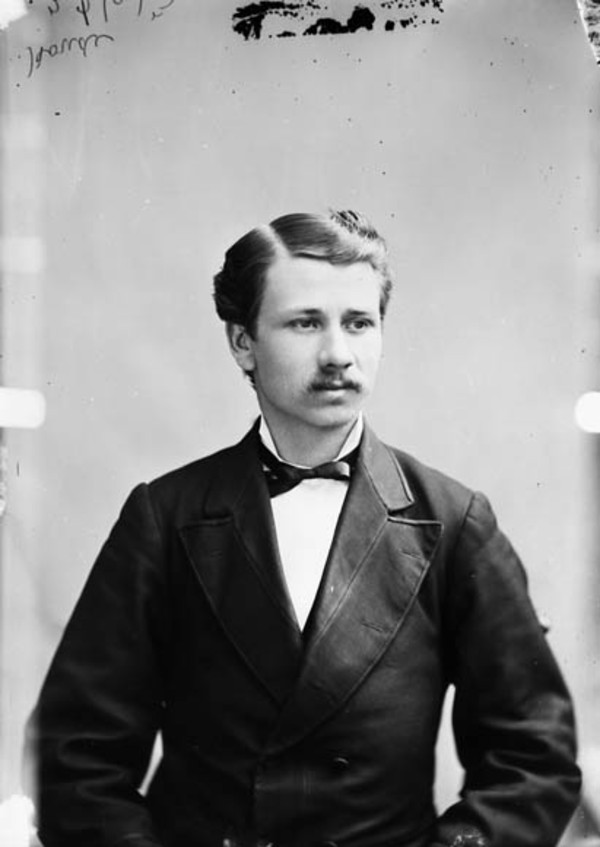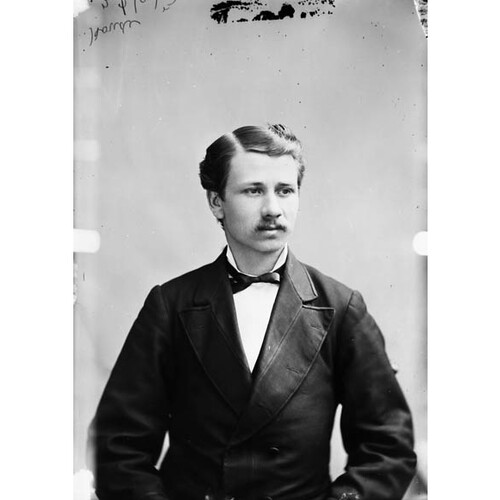HOUDE, FRÉDÉRIC, journalist and politician; b. 23 Sept. 1847 at Saint-Antoine-de-la-Rivière-du-Loup (Louiseville), Canada East, son of Antoine Houde, farmer, and Angèle Descoteaux; d. 15 Nov. 1884 at his birthplace.
Frédéric Houde received his secondary education at the Séminaire de Nicolet and in 1868 became an assistant editor of Le Constitutionnel in Trois-Rivières. In 1869 he emigrated to New England and was associated with various newspapers in the new parishes then being established for French Canadian immigrants. He worked briefly for L’Étendard national of Worcester, Mass. (a special edition of L’Opinion publique of Montreal), and then moved to Le Protecteur canadien of St Albans, Vt. When the latter ceased publication in September 1871 after a fire in the printing shop, Houde joined forces with Antoine Moussette to found L’Avenir national at St Albans in October 1871. Later he went into partnership with Ferdinand Gagnon to launch Le Foyer canadien in Worcester on 18 March 1873. In August 1874 Houde bought Gagnon’s share and moved the paper to St Albans, where in June 1875 he arranged a merger with Le Nouveau Monde of Montreal.
During his six years in New England, Houde was extremely active in Franco-American associations and in the annual Francophone conventions held in American cities. He was one of the principal organizers of the huge French Canadian and Franco-American congress held in Montreal on 24 June 1874 to celebrate the 40th anniversary of the Association Saint-Jean-Baptiste de Montréal and to reunite the “brother emigrants” whose exodus was deplored [see Ferdinand Gagnon]. On this occasion, Houde vigorously defended Siméon Pagnuelo’s resolution in support of Louis Riel. Riel went to Worcester to thank Houde and spoke at a public meeting there (18 July 1874).
Houde returned to Canada in 1875 and played a prominent part in ultramontane journalism as editor of Le Nouveau Monde, the unofficial organ of Bishop Ignace Bourget of Montreal. In July 1879 Houde became its sole proprietor, while retaining his connection with Le Foyer canadien. Houde’s journalistic career came to a sudden end in 1882 as a result of his involvement in the ecclesiastical dispute over the Montreal rights of Université Laval. On 24 January Le Monde received from Archbishop Elzéar-Alexandre Taschereau* of Quebec a letter, to be published “without comment,” written by Cardinal Giovanni Simeoni, prefect of the Sacred Congregation of Propaganda, which denounced “the individuals who claim to be defending Montreal” in the quarrel. Le Monde published the letter, but two days later (26 January) Houde wrote a strong article accusing Archbishop Taschereau of “making undue use of his influence” with the cardinal to secure the latter’s statement in favour of Université Laval. Immediately Bishop Édouard-Charles Fabre* of Montreal communicated to Houde his disapproval of the article and ordered him to repudiate it. Convinced that he could not in conscience retract what he had written, yet unwilling to oppose his bishop, Houde promptly announced (27 January) his intention to sell his newspaper and to abandon journalism.
Houde had, however, other irons in the fire. On 17 Sept. 1878 he had been elected a Conservative member of the House of Commons for Maskinongé; he was re-elected 20 June 1882 and served until his death. In the house he was a frequent speaker, his remarks being moderate and informed. He spoke against patronage and in favour of protectionism. He also did not hesitate to oppose Wilfrid Laurier* in April 1882 when he was convinced that Laurier was being unfair to his French Canadian compatriots in attributing the failure to elect many Liberals to the manipulation of popular prejudices by the press and the Conservative party. Houde was also president of the Club Cartier of Montreal and lieutenant-colonel commanding the 86th battalion of Trois-Rivières militia. In 1880 he published in Le Nouveau Monde a historical novel, “Le manoir mystérieux, ou les victimes de l’ambition,” which appeared in book form with an introduction by Casimir Hébert in 1913. Subsequently, Lionel Léveillé, in 1914, and Abbé Albert Dandurand, in 1937, showed that Houde’s novel was in reality a skilful transposition into a Canadian setting of Sir Walter Scott’s Kenilworth.
A tireless defender of French Canadian rights, one of the founders of Franco-American journalism, and a devout Roman Catholic whose convictions sometimes brought him into conflict with the hierarchy, Houde was astonishingly active despite a tubercular condition. He died at the age of 37, after delivering a long speech to his constituents in a cold autumn rain. He was survived by his wife, Catherine Dougherty, whom he had married on 28 June 1874, and by two sons and a daughter.
Frédéric Houde was the author of the novel “Le manoir mystérieux, ou les victimes de l’ambition,” first serialized in Le Nouveau Monde (Montréal), from 20 Oct. to 14 Dec. 1880, and then published in part in La Lyre d’or (Ottawa), 2 (1889), nos.4–6. The novel was published as a separate volume in Montreal in 1913.
L’Étendard (Montréal), 18 nov. 1884. Dominion annual register, 1884: 229. Belisle, Hist. de la presse franco-américaine. Josaphat Benoît, L’âme franco-américaine (Montréal, 1935), 139. T.-A. Chandonnet, Notre-Dame-des-Canadiens et les Canadiens aux États-Unis (Montréal, 1872), 72, 99, 100. Albert Dandurand, Le roman canadien-français (Montréal, 1937), 100–1. Ferdinand Gagnon: biographie, éloge funèbre, pages choisies, M.-E. Martineau, édit. (2e éd., Manchester, N.H., 1940), 18–19. Germain Lesage, Histoire de Louiseville, 1665–1960 (Louiseville, Qué., 1961), 236, 241, 259–60. Rumilly, Hist. de la prov. de Québec, III: 145–51; Histoire des Franco-Américains (Montréal, 1958), 67–75, 81. H.-L. Auger, “Frédéric Houde,” L’Écho de Saint-Justin (Louiseville), 1er févr. 1923. Charles Drisard, “Frédéric Houde,” L’Écho de Saint-Justin, 1er févr. 1927. Edmond Léo, “Causerie littéraire: Le manoir mystérieux, roman canadien inédit, par Frédéric Houde,” Le Devoir (Montréal), 6 sept. 1913. “Frédéric Houde,” BRH, 33 (1927): 456. [Lionel Léveillé], “Curiosités littéraires: roman canadien inédit par . . . Walter Scott,” Le Nationaliste (Montréal), 10 mai 1914.
Cite This Article
David M. Hayne, “HOUDE, FRÉDÉRIC,” in Dictionary of Canadian Biography, vol. 11, University of Toronto/Université Laval, 2003–, accessed December 30, 2025, https://www.biographi.ca/en/bio/houde_frederic_11E.html.
The citation above shows the format for footnotes and endnotes according to the Chicago manual of style (16th edition). Information to be used in other citation formats:
| Permalink: | https://www.biographi.ca/en/bio/houde_frederic_11E.html |
| Author of Article: | David M. Hayne |
| Title of Article: | HOUDE, FRÉDÉRIC |
| Publication Name: | Dictionary of Canadian Biography, vol. 11 |
| Publisher: | University of Toronto/Université Laval |
| Year of publication: | 1982 |
| Year of revision: | 1982 |
| Access Date: | December 30, 2025 |




